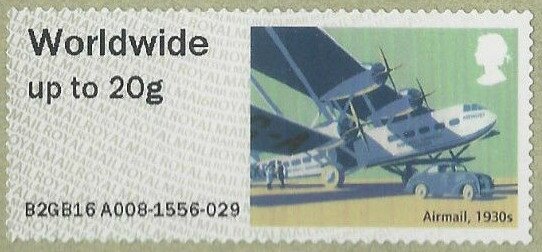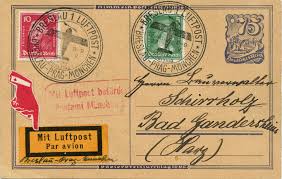Stamp: Airmail, 1930s (United Kingdom of Great Britain & Northern Ireland 2016)
Airmail, 1930s (United Kingdom of Great Britain & Northern Ireland 2016)
17 February (United Kingdom of Great Britain & Northern Ireland ) within release Royal Mail Heritage: Transport goes into circulation Stamp Airmail, 1930s face value Various No Face Value
| Stamp Airmail, 1930s in catalogues | |
|---|---|
| Michel: | Mi: GB AT107I |
Stamp is horizontal format.
Possible face values: 1st Class up to 100 g (initial value: 63 p) 1st Large up to 100 g (initial value: 95 p) Euro 20 g / World 10 g (initial value: 1 £) Worldwide up to 20 g (initial value: 1.33 £) Europe up to 100 g (initial value: 1.52 £) Worldwide up to 100 g (initial value: 2.25 £)Also in the issue Royal Mail Heritage: Transport:
- Stamp - Royal Mail Minivan, 1970s face value Various;
- Stamp - Mail coach, 1790s face value Various;
- Stamp - Falmouth packet ship, 1820s face value Various;
- Stamp - Travelling Post Office, 1890s face value Various;
- Stamp - Post boy, 1640s face value Various;
- Stamp - Airmail, 1930s face value Various;
- Stamp - Travelling Post Office, 1890s face value SD1;
Stamp Airmail, 1930s it reflects the thematic directions:
An aircraft (pl. aircraft) is a vehicle that is able to fly by gaining support from the air. It counters the force of gravity by using either static lift or the dynamic lift of an airfoil, or, in a few cases, direct downward thrust from its engines. Common examples of aircraft include airplanes, rotorcraft (including helicopters), airships (including blimps), gliders, paramotors, and hot air balloons.Part 1 (Definitions and Abbreviations) of Subchapter A of Chapter I of Title 14 of the U. S. Code of Federal Regulations states that aircraft "means a device that is used or intended to be used for flight in the air."
Postal history is the study of postal systems and how they operate and, or, the study of the use of postage stamps and covers and associated postal artifacts illustrating historical episodes in the development of postal systems. The term is attributed to Robson Lowe, a professional philatelist, stamp dealer and stamp auctioneer, who made the first organised study of the subject in the 1930s and described philatelists as "students of science", but postal historians as "students of humanity". More precisely, philatelists describe postal history as the study of rates, routes, markings, and means (of transport).


